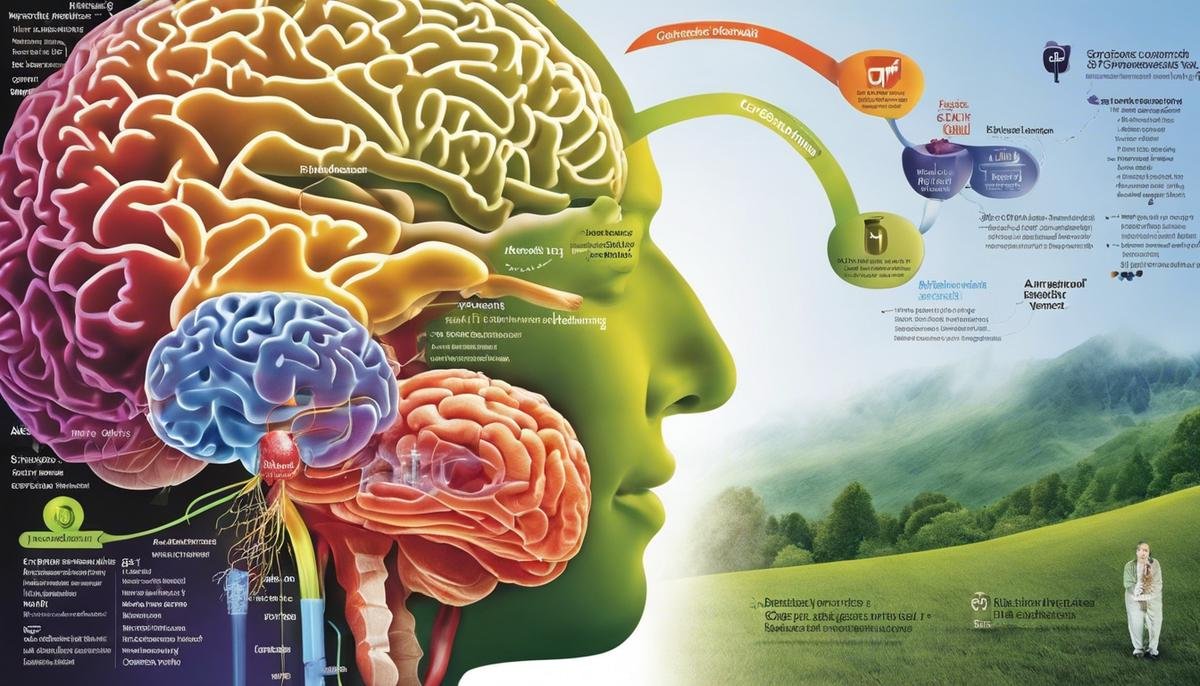
The intricate ecosystem of microorganisms residing in our digestive tract, known collectively as the gut microbiome, plays a pivotal role in our overall well-being—a concept underscored by the burgeoning field of probiotics research. Probiotics, often referred to as “friendly bacteria,” are live microorganisms that confer a health advantage to the host when administered in appropriate amounts. The benefits of these microscopic allies extend beyond the conventional understanding of digestive health, reaching into the intricate nexus between our gut and brain. This is particularly significant in the context of Autism Spectrum Disorders (ASD), where an evolving body of research suggests a substantial link between gut health and neurological function. As we navigate the complexities of this connection, our exploration will shed light on how the strategic inclusion of probiotics in the diet may offer supportive avenues for managing certain symptoms associated with autism.
Understanding Probiotics and Their Function
Probiotics: The Tiny Powerhouses of Family Health
Hey there, fellow parents and homemaking heroes!
Have you ever heard someone raving about the benefits of probiotics and wondered what the fuss was all about? Well, grab a cup of your favorite beverage, settle in, and let’s dive into the world of these microscopic marvels that have been taking the health world by storm.
Probiotics are like the friendly neighbors of our gut community, living organisms that are good for our health, especially our digestive system. They are often called “good” or “helpful” bacteria because they help keep the gut healthy. Think of them as a mini army that stands guard to balance the ecosystem in your intestinal flora.
But how do they work? This is where things get fascinating! These good bacteria are all about keeping the balance. When you have enough of them in your gut, they can outnumber and crowd out the bad bacteria—the kind that can make you and your family sick. They also work to maintain the integrity of the gut wall, which acts as a defensive line against toxins and harmful bacteria trying to enter the bloodstream.
Now, you might wonder where one can find these health warriors. Probiotics are naturally found in some fermented foods like yogurt, kefir, sauerkraut, and kimchi. For the busy family, though, sometimes it’s challenging to get enough through diet alone. This is where a high-quality probiotic supplement can step in to save the day, ensuring your family gets their daily dose of gut-friendly bacteria.
Including probiotics in the family’s routine is super easy. Start with a probiotic-rich yogurt at breakfast or offer fermented pickles as a crunchy snack. For little ones, or those who are a bit finicky about flavors, a daily supplement can be just as effective.
The takeaway here is that probiotics are a simple yet powerful tool in maintaining the family’s digestive health and overall well-being. Like in family and homemaking, it’s all about creating the right balance, and these tiny organisms sure pack a punch in helping achieve that.
So, next time you hear the term “probiotics,” you’ll not only understand the hype but you’ll be ready to incorporate these little wonders into your family’s health routine. Here’s to a happy gut and a happy home!
Cheers to thriving families and well-stocked fridges with all kinds of probiotic goodness!
Keep flourishing, amazing homemakers and parents!

Examining the Gut-Brain Connection in Autism
Unraveling the Mysteries of the Gut-Brain Axis in Autism Spectrum Disorders
For many of us who cherish the growth and development of our children, understanding the nuances of their well-being is a full-time commitment. When exploring the complexities of Autism Spectrum Disorders (ASD), a ground-breaking area of research—the gut-brain axis—offers fascinating insights worth embracing in our journey of parenting and caregiving.
The gut-brain axis refers to the two-way communication network that links the emotional and cognitive centers of the brain with peripheral intestinal functions. Latest studies have revealed that this connection might hold pivotal clues in comprehending certain characteristics of ASD.
Children with ASD often experience gastrointestinal (GI) issues, such as abdominal pain, constipation, or diarrhea, at a higher rate than their neurotypical peers. This is not merely coincidental. The gut-brain axis suggests that the health of one’s stomach—often dubbed the ‘second brain’—could influence neurological and behavioral functions. Here’s the million-dollar question: how exactly does this axis relate to ASD?
First off, in the intricate ballet that is the gut-brain axis, the enteric nervous system plays a lead role. This extensive mesh-like system of neurons governing the function of the GI tract is in constant chatter with the central nervous system. Disruption to this communication could affect behavior and social interactions—two facets often challenged in those with ASD.
Microbes in the gut also star in this production. The gut microbiome—the vast community of bacteria residing in the GI tract—has a significant impact on the brain’s development and function. Its composition can influence the production of neurotransmitters like serotonin and GABA, which are essential for mood regulation and can be atypical in individuals with ASD.
Furthermore, a condition termed ‘leaky gut syndrome,’ where the intestinal barrier becomes permeable, allowing substances to leak into the bloodstream, is postulated to contribute to the symptoms observed in ASD. A compromised barrier could permit toxins, undigested food particles, and bacteria to enter the bloodstream and potentially trigger an immune response, which might affect brain function.
So, what does this information mean for those navigating the world of ASD with their loved ones? Acknowledging the gut-brain axis’s role opens up new avenues for therapeutic strategies. While much research is still needed, preliminary results suggest that interventions aiming to restore gut health, such as diets targeting the microbiome balance or use of prebiotics, could ameliorate some ASD symptoms.
In summary, recognizing the connection between the gut and the brain could be an essential piece of the puzzle in supporting individuals with ASD. By championing research and considering the implications of the gut-brain axis in daily life, families can hope to uncover more holistic paths towards health and well-being.
As surely as a hearty homemade meal can bring a family together, the knowledge shared around the table about our bodies’ intricate workings keeps us empowered and connected. Let’s continue to explore, learn, and nurture—supporting our loved ones with ASD through every bite, every discovery, every day.

Research on Probiotics and Autism
Unlocking the Science: Probiotics and Their Potential Link to Autism Spectrum Disorders
As anyone with a heartbeat in the realm of family health knows, probiotics have been climbing the popularity charts faster than a toddler on a playground. They get their praises sung for various reasons—from bolstering gut health to waving a wand over digestive discomforts. Yet, the more intriguing tune nowadays is the scientific symphony playing around probiotics and Autism Spectrum Disorders (ASD).
Now, hold onto those kitchen stools because this is where it gets interesting. Scientific minds, always peeling back the layers of how things tick, are now turning the spotlight on something called the gut-brain axis. Think of it as an intimate chat line between your belly and your brain, only they’re talking in chemical emojis called neurotransmitters.
Researchers are getting particularly chatty about how kids with ASD often face a tummy-troubled road, dealing with all sorts of gastrointestinal (GI) issues. It’s like a game of telephone gone wrong, where the messages between the enteric nervous system in the gut and the noggin aren’t quite delivering. It’s not hard to imagine how this mix-up might affect a child’s day-to-day.
And it’s not just about the messages going haywire. The zillions of microbial buddies in the gut microbiome are thought to waltz with brain development and function. It’s like a microscopic ballroom in there, and everyone’s got to follow the beat for harmony. But what happens when the band’s out of sync? Some scientists believe it could play a role in how ASD symptoms manifest.
Moreover, this whole notion of “leaky gut syndrome” pops into conversations now and again. It’s this idea that when the gut’s harmony gets disrupted, things could sneak out into the body that are supposed to stay put – kind of like a toddler slipping out the front door when no one’s looking. The result? An immune system throwing a tantrum, potentially ramping up those ASD symptoms.
So, where do probiotics waltz into all of this? They’re like the calm, collected grandma entering the room, setting things right. By potentially helping to maintain a healthier balance within the gut’s ecosystem, probiotics might just help smooth out some of that neurotransmitter chatter. And with softer communication, some families have reported sighs of relief in the ASD journey.
It’s no secret that the ultimate goal is to wrap arms around every individual with ASD, giving support that’s as warm as a freshly baked cookie. And while probiotics aren’t handing out miracles, every bit of encouragement counts, especially when it might just make a difference in a family’s loving struggle.
But, before anyone starts turning their kitchen into a fermentation station or ordering probiotics by the truckload, it’s important to remember—science is still in its courtship with understanding the full potential here. Each day unwraps more about the puzzling maze of ASD, tugging at the threads of hope for more comprehensive, holistic approaches.
In the end, bolstering gut health through thoughtful strategies should be a part of the conversation. The research is promising though not yet definitive. It folds into a broader dialogue about nurturing each unique individual on the spectrum, honing in on the support and love they deserve.
As the pages of research turn and the mystery unravels, families remain the heart and soul of this journey. Their unyielding drive to discover, understand, and advocate continually reshapes the landscape of ASD support. And probiotics? They’re increasingly a part of that evolving narrative, potentially offering a spoonful of support in the science of gut-brain harmony.

Incorporating Probiotics into an Autism Diet
Now that we’ve laid the groundwork for the interaction between the gut and brain and how it affects our kiddos on the autism spectrum, let’s roll up our sleeves and dig into the nitty-gritty of weaving probiotics into an autism-friendly diet effectively. It’s all about balance, understanding individual needs, and yes, a bit of clever culinary creativity.
Understanding individual dietary needs is essential when it comes to children with Autism Spectrum Disorders (ASD). Some children may have specific food sensitivities, and integrating new foods—probiotic-rich or otherwise—should always be approached with an eye for any adverse reactions. It’s a dance of trial and error sometimes, but oh so worth it when a happy tummy leads to happier days.
With family life being a whirlwind of activities and commitments, incorporating probiotics for a child on the autism spectrum shouldn’t add to the stress. Opt for probiotics in forms that children already enjoy. If your little one has a penchant for smoothies, for instance, adding a dash of kefir or a spoonful of coconut yogurt can make for a seamless integration. It’s like sneaking in a secret ingredient into a favorite family recipe—nobody knows it’s there, but everyone feels the goodness!
For little palates that are particularly selective, probiotic-fortified foods can be a godsend. The market offers a spectrum of products—everything from cereals to snacks—that now contain these helpful microorganisms. Just watch for added sugars or unfamiliar ingredients—after all, reading labels should be every parent’s superpower.
Mealtime should always be about connection and pleasure, not coercion or battles. Introducing probiotics in the forms of tastes and textures that are already preferred in your household is key. Got a fan of crunchy textures? Probiotic-rich pickles could be your ally. Or maybe there’s a love for creamy treats in the house? Enter stage left: probiotic-infused ice cream and puddings.
Creating a culinary canvas that’s both autism and probiotic-friendly could also mean getting a little crafty in the kitchen together. Cooking with children can be an opportunity for learning and bonding—and guess what—it can be the perfect time to introduce and experiment with new foods. Whip up some homemade sauerkraut or have a go at fermenting some veggies. You might just be surprised at what tickles their taste buds!
Another cornerstone in this whole dietary adventure is ensuring the continuity of probiotic intake. One-off shots won’t do the trick. So consider a daily probiotic supplement if consistency with food intake is a challenge. These supplements come in various child-friendly forms, from chewables to liquid drops, and can take the guesswork out of daily doses.
Building a supportive community around your family’s nutrition needs can also work wonders. Sharing tips with other parents, pooling resources for probiotic-rich recipes tailored for ASD, and encouraging each other along the way can bolster confidence and patience.
Remember, when it comes to nurturing health, especially for our incredible children on the spectrum, the journey is as significant as the destination. Small steps, lots of love, and a good probiotic here and there can contribute to a harmonious gut-brain connection and an overall sense of wellbeing for the entire family. Here’s to happy bellies and hearty smiles!
Always consult with your healthcare provider before making significant dietary changes or introducing supplements, particularly for children with specific health considerations like ASD. Our unique little ones deserve personalized care as special as they are.

Dietary Considerations and Precautions
As families delve deeper into understanding Autism Spectrum Disorders (ASD) and the gut-brain connection, many are exploring diet as a potential avenue for supporting their loved ones. In light of this, it’s critical for families to keep in mind certain key aspects when modifying diets to support individuals with ASD.
First and foremost, remember that every child is unique, including their dietary needs and responses. What works for one child may not suit another. It’s essential to observe and understand the individual’s reactions to different foods, keeping an eye out for possible allergies or intolerances that may exacerbate symptoms.
Embrace whole foods as a cornerstone of the diet. Whole, unprocessed foods tend to be richer in the nutrients that our bodies need to function at their best. For children with ASD, focusing on a variety of fruits, vegetables, lean proteins, and whole grains can offer a spectrum of vitamins and minerals beneficial for brain health and overall vitality.
Respect the child’s preferences and starting point. Whenever changes are being considered, it’s vital to introduce them gradually. Radically altering a familiar diet can lead to resistance or added stress. Start with the preferred foods and find ways to enhance their nutritional value or introduce new items slowly.
Pay close attention to the nutritional content of foods. Especially for families considering the incorporation of probiotics and other supplements, it’s necessary to scrutinize labels for any hidden additives or excessive sugars that might undermine the health benefits being sought.
Keep the focus on balance and variety rather than restriction. This isn’t about creating a list of ‘bad’ foods but rather expanding the palate to include ‘good’ foods that promote a happy, healthy gut. Encouraging a well-rounded diet can help minimize nutritional deficiencies and support robust development.
Engage children in food selection and preparation to encourage a positive relationship with food and nutrition. This nurtures independence and confidence, both incredibly valuable for children on the spectrum who may face added challenges in these areas.
Stay updated with the latest research and advice from professionals in the field. The science of nutrition and ASD is constantly evolving, and what is beneficial for gut health today may be refined tomorrow.
Finally, remember that food isn’t just fuel. It’s a means of expression, creativity, and joy. In the busy lives that families lead, mealtime can be an opportunity to slow down, connect, and build happy memories together.
By approaching dietary changes with compassion, mindfulness, and informed choice, families can support their loved ones with ASD in finding greater harmony within themselves and with the world around them.

Armed with an enriched understanding of probiotics and their potential implications for the gut-brain axis, particularly within the autism community, it becomes apparent that nutrition can be an instrumental ally in supporting neurological and overall health. While the promise of probiotics in the autism diet heralds an exciting frontier, it also ushers in an era of heightened responsibility. Navigating dietary interventions requires a judicious blend of optimism and caution, with a personalized approach under the guidance of healthcare professionals. By honoring the unique needs of individuals with ASD and fostering an environment of informed dietary choices, we propel ourselves toward a future where well-being is nurtured from the inside out. As research advances, it paves the way for transformational insights, ultimately empowering individuals, families, and caregivers to make decisions that are as nourishing to the mind as they are to the body.




